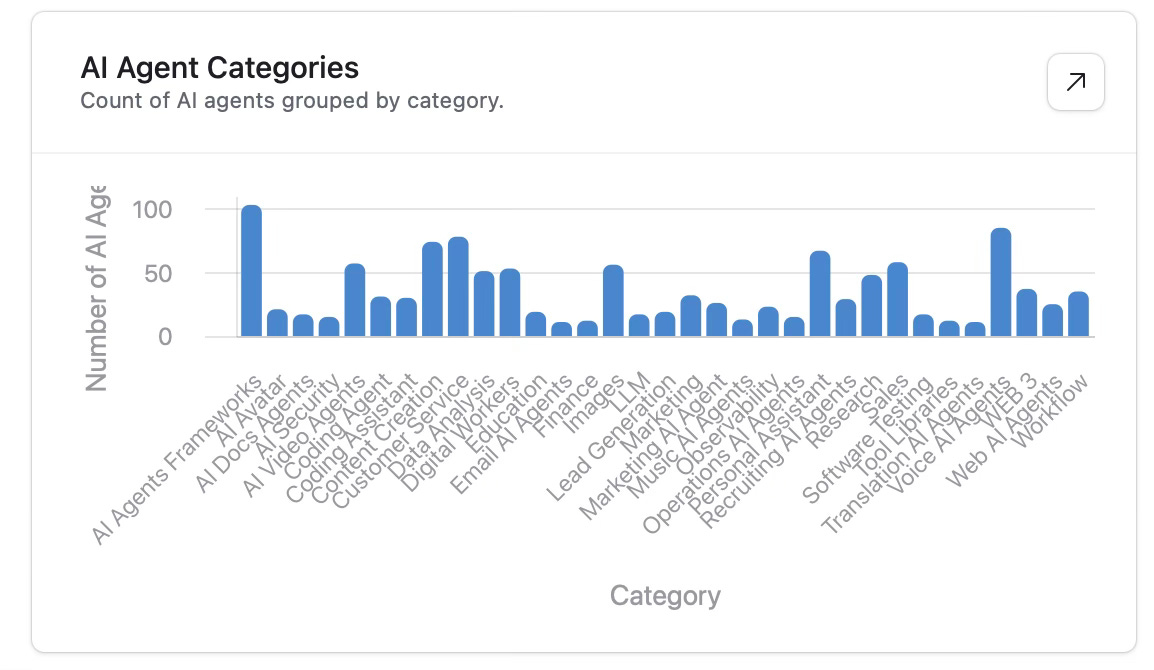The Mid-Market Playbook for AI Agents: What to Buy, Build, and Skip
What to buy, what to build, what to avoid.
Hey AI Productivity Explorer,
It will be an understatement to say we live in an agent economy, or at least you are starting to feel that way.
In fact, if you walk into any mid-market company’s boardroom right now and say “AI agents,” you’ll get a dozen different reactions. Excitement. Curiosity. Fear. A few eye-rolls. It’s the buzzword that everyone’s heard, but very few leaders actually know how to translate it into business outcomes.
This feels eerily familiar.
Remember the early days of smartphone apps?
Back then, we downloaded dozens, got excited by novelty… and then ignored most of them. In fact, data shows that the average mobile app loses over 95% of its Daily Active Users (DAUs) by the 90-day mark, meaning that almost all the apps on our phones fall into the “installed but ignored” category . That app economy turned into an app-sphere a wasteland of noise where only a few breakouts actually stick.
As a mid-market, you don’t have the endless budget of a Fortune 500 to experiment with twenty different tools.
But you also can’t move as recklessly as a startup chasing the latest shiny thing. Every dollar matters. Every technology decision either moves the needle or becomes another system collecting dust.
That’s where AI agents get tricky.
On one hand you have a software solution that doesn’t just automate tasks, but works across systems like a digital teammate.
On the other hand, thousands of “agents” in dozens of categories, each claiming to be revolutionary. Some are legit but many are vaporware. If you pick a wrong one, you burn months of time and budget.
So I decided to cut through the noise. Over the past few weeks, I have analyzed 1,132 AI agents across 40+ categories.
Overview of 1,132 based on 40+ categories
Not demos, not hype decks, but actual tools. The patterns I found tell a much clearer story than the headlines.
Some categories are overcrowded, with tools that all look the same. Others are dangerously underdeveloped, but hold the biggest opportunities if you’re willing to build or partner. Hidden inside the noise are the tools that could quietly save you millions in cost, time, and missed opportunity.
Consider this post a decision guide. By the end, you’ll know:
You should buy off-the-shelf because the tools are ready.
Where you should build or partner because the market isn’t there yet.
Which categories you should avoid entirely for now.
This will be a longer post, as I want the analysis and content, so you can make informed decisions.
Table of Contents
The Buy vs. Build Dilemma
Why mid-market leaders face tougher choices than startups or enterprises, and the factors that drive the decision.
What 1,132 AI Agents Reveal
Frameworks Are Exploding
Voice Agents: The New Gold Rush
Customer Service: Overcrowded and Risky
Hidden Gems and Vertical Assistants
Video Agents: The Quiet Workflow Revolution
Integration: The Achilles Heel
Workflow & Compliance: The Blue Ocean
The Buy, Build, or Avoid Takeaways
My recommendations for mid-market executives to cut through the noise and choose wisely.
Closing Thoughts
The Buy vs Build Dilemma
Every company I’ve worked with or consulted with, whether inside a Fortune 100 or mid-market executives or startups, has run into the same sticking point: should we build, buy, or partner for digital capabilities?
One example I want to share was a company that was preparing to build its own large language model (LLM) from scratch. On paper, the idea looked visionary because they had a lot of cash.
Additionally, owning the model would mean controlling their destiny, tailoring it to proprietary data, and avoiding vendor lock-in.
But when I evaluated it against a simple Build–Partner–Buy decision matrix, the picture shifted.
Keep reading with a 7-day free trial
Subscribe to Solve with AI to keep reading this post and get 7 days of free access to the full post archives.



